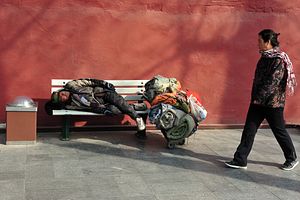Since Deng Xiaping began the process of economic reform, the promise of a higher standard of living has motived millions of rural Chinese to move to urban areas. In chasing that dream, however, migrants have had to contend with a harsh policy that is a legacy of an earlier time.
The hukou or household registration system instituted by Mao Zedong sought to segregate urban and rural areas and give different rights and benefits to rural and urban Chinese. Entitlements to free education for their children, free healthcare benefits, and subsidized housing that were automatically available to urban residents remained out of reach of migrants. Worse, migrants were treated as second-class citizens in urban areas. Many scholars have called the hukou system institutionalized discrimination against rural people.
As The Economist puts it, “If China’s level of urbanization were calculated on the basis of hukou, rather than residency, it would be a mere 36%, not far ahead of India’s (31%).” While the above statements might tell us about the size of non-urban hukou holders, it also reveals a lot about discrimination. Very few rural migrants have ever received their urban hukou and even their city-born children suffer discrimination.
Fortunately, in July 2014, Xi Jinping’s administration finally announced that it would reform the hukou system by adopting a points-based system. This means that people who achieve a sufficient number of points by meeting certain criteria can now become urban citizens and benefit from government entitlements. However, this reform applies only to certain people, such as younger migrants in smaller towns. The reform might be a step towards equality, but it doesn’t touch on cities like Beijing and Shanghai, where a third of the population are non-urban hukou holders.
Moreover, the government’s plan for giving the urban hukou card to rural migrants faces some serious challenges.
First, there is the issue of linking rural hukou with land entitlements. Given the discrimination rural-to-urban migrants face, it seems odd that these people might themselves resist reforms. But one of the institutional and policy problems, which acts as an ongoing deterrent to hukou system reform, is land ownership. Rural hukou holders are entitled to a small plot of land in their village. They cannot sell the land unless a collective consensus is reached among local farmers. But they can always mortgage it out.
The Economist cites a senior official on the National Health and Family Planning Commission, who says “as many as 70% of rural migrants wanted to stay in the cities but had no wish to give up their rural hukou” because of their land rights. To overcome this barrier, the government should consider gradually reforming the common holding of land rights and give farmers the right to sell their land individually.
Another challenge is presented by welfare and fiscal issues. Many experts believe that even if the local government grants urban hukou to migrants, problems will remain because of fiscal constraints and the universality of benefits.
One way the Chinese government can tackle this problem is by separating out the link between household registration and welfare benefits within the hukou system. Take the policies adopted by many developing countries such as India, Brazil. Irrespective of who migrates to the city, anyone is eligible for a household registration card. As for welfare benefits, instead of providing universal welfare benefits to all residents in urban areas, the scheme should be targeted at the urban poor only (including rural migrants). This targeted approach will also help China solve its inequality problem.
If the hukuo reforms are to work, China will also need to carry out fiscal reforms. It has been 20 years since the last comprehensive fiscal reforms in 1994 and local governments have become overly reliant on transfer payments from the central government.
Switching to a value-added tax system could be one tool for taxation reform. The central government should also raise the percentage of tax revenues retained by local governments from 30 percent to at least 50 percent, to help them manage their budget.
While China should be proud of its economic miracle, it has come at the cost of the environment, discriminatory policies, and inequality. Meaningful reforms to the hukuo system will need to delink welfare entitlements. And for that to work, China should consider targeted welfare schemes as an mechanism for achieving a more equal society.
Gaurav Daga is a public policy analyst, trained in public policy and engineering.

































